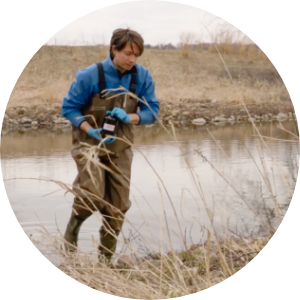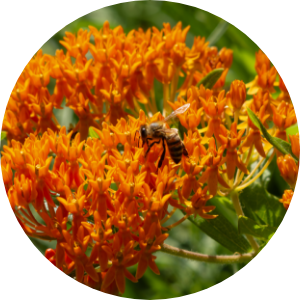Our Water > Neonics
Neonicotinoids and Their Impact
Once hailed as a breakthrough in pest control, neonicotinoids (or “neonics”) are now raising serious concerns for Wisconsin’s ecosystems, waterways, and communities. As these insecticides spread through our soil and water, their long-term effects are coming into sharper—and more troubling—focus.
Jump to Section
Explore Our Approach
Overview
What Are Neonics?
Neonicotinoids, or neonics, are insecticides used across the globe to target insects that feed on crops like corn and soybeans. Introduced in the 1990s, they gained popularity for their ease of use and perceived safety.
But as their use has expanded, so have concerns. Neonics are showing up in water supplies and harming fish, birds, and pollinators like bees. Despite being marketed as efficient and low-risk, newer research shows their environmental harm may far outweigh their benefits.
1990s
Neonics are introduced and quickly adopted by farmers.
2010s
Nearly all U.S. corn seed and about half of soybean seed is neonic-treated by mid-decade.
2000s
About 30% of U.S. field corn is treated with neonics. Use on soybeans begins to rise.
Videos
Stories That Matter
https://youtu.be/6GL6FMxi8AM
Wisconsin Neonic Forum Part 4
https://youtu.be/0RNOGMPeHrk
Wisconsin Neonic Forum Part 3
MOUNTING RISKS
What’s at Risk?
Despite their popularity, neonics are posing serious threats to both ecosystems and public health. So why are we still using them?
Hard to avoid
Most corn and soybean seeds are pre-treated with neonics, giving farmers few choices.
Pollinator decline
Bees and other beneficial insects are disappearing in areas with heavy neonic use.
Water contamination
In Wisconsin, neonics have been found in 5% of drinking wells in agricultural zones and 69% of irrigation wells.
Aquatic harm
Once in rivers and lakes, neonics kill off species like mayflies—key to fish diets.
Questionable value
A 2021 Cornell study found neonics had no benefit to corn yield 83% of the time.
Share with your network
Help spread the word about neonics and their widespread effects.
Download the Neonic fact SheetGET INVOLVED
Join the Conversation on Neonics
The Wisconsin Neonicotinoid Workgroup brings together farmers, researchers, water experts, and community members to share information, explore solutions, and ensure everyone has a seat at the table.
Are you a farmer using neonics and want to understand alternatives?
A researcher studying their effects?
Concerned about your community’s water or pollinator populations?
You have a role to play. If you want to learn more or get involved, email us at wisconsinneonicworkgroup@office365.wisc.edu
If you’d like to arrange a presentation on the use and impacts of neonics for your community group, please email Water and Agriculture Program Director Sara Walling at swalling@cleanwisconsin.org
KEY INITIATIVES
What Are We Advocating For?
Clean Wisconsin is working to reduce the harmful impacts of neonicotinoids on our environment, pollinators, and water. We’re engaging with farmers, researchers, and policymakers to promote safer, science-backed approaches to pest control that protect both agriculture and ecosystems.

Reducing Reliance on Neonic-Treated Seeds
We advocate for increased access to untreated seeds and support farmers exploring integrated pest management (IPM) practices that reduce the need for chemical treatments without sacrificing crop health.

Expanding Water Monitoring and Public Awareness
Neonics are showing up in drinking and irrigation wells across Wisconsin. We’re pushing for more comprehensive testing, better data collection, and public reporting to understand where and how these chemicals are contaminating water supplies.

Protecting Pollinators and Biodiversity
With pollinator populations in decline, Clean Wisconsin supports policies that reduce neonics in agricultural and residential use and promote habitat restoration to help bees and other beneficial insects recover.

Elevating Research and Collaboration
As a key member of the Wisconsin Neonicotinoid Workgroup, we bring together scientists, farmers, and advocates to share the latest research, identify gaps in knowledge, and foster practical solutions that work for everyone.

Advocating for Policy Change
We’re calling for stronger state and federal regulations around neonic use, clearer product labeling, and increased investment in sustainable pest control alternatives that protect Wisconsin’s land, water, and future.
Resources
Neonic Use Resources
Explore research, fact sheets, and policy updates on neonicotinoids and their impact on Wisconsin’s water, ecosystems, and pollinators.
Latest News
Expert Insights
Under the Lens: Pesticides in Wisconsin drinking water
While pesticides play a significant role in agriculture, their use comes with health, environmental, and ecological concerns.
Read MoreExpert Insights
Podcasts
What to know about PFAS pesticides
A look what could soon be sprayed on food and farm fields across Wisconsin.
Listen NowLatest Podcast
Action Alerts
Clean Water Act at risk!
House of Representatives has passed the destructive PERMIT Act, but the fight is not over!
Take ActionAction Alert
SIGN UP
Join the Fight Against Neonic Use
Sign Up For Email Updates
"*" indicates required fields